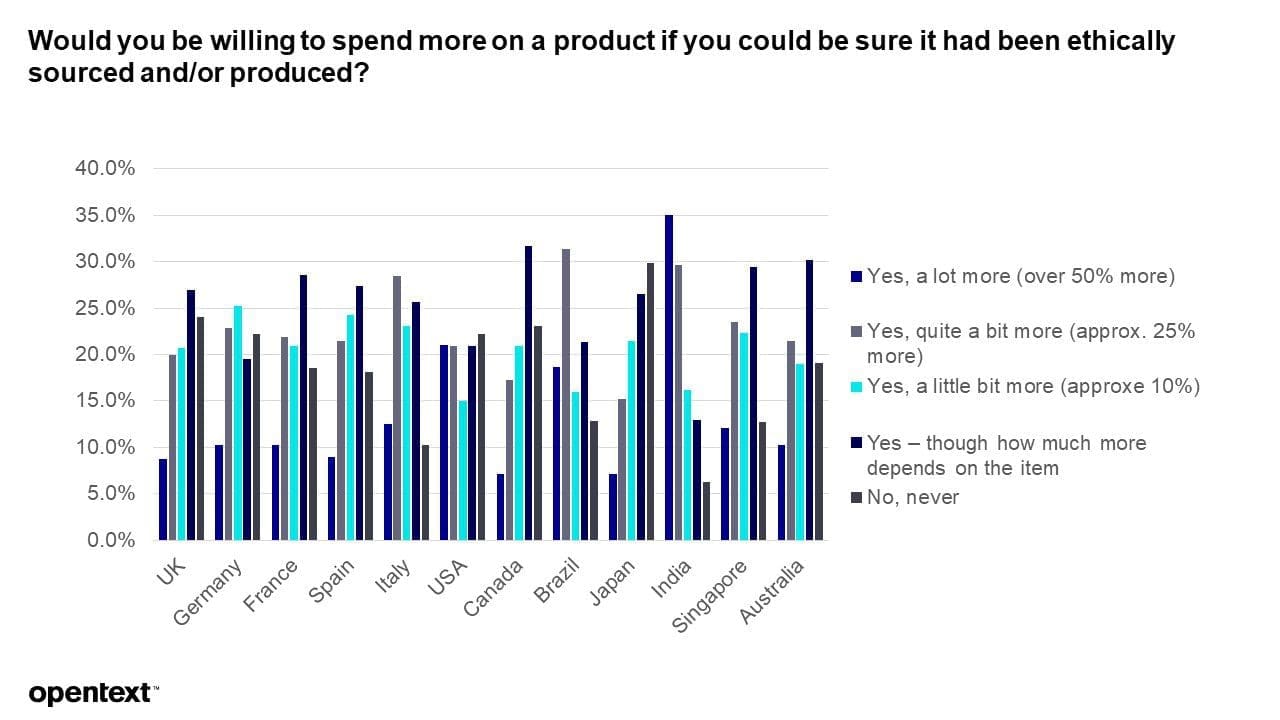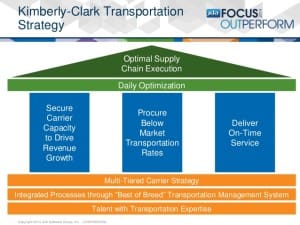 In recent years, sustainability has become front and center for both consumers and brands in an effort to reduce the impact and effect of climate change. Sustainability initiatives come in all shapes and sizes, including responsible product packaging, energy efficiency, alternative fuels, optimizing routes for trucks, and efficient returns management programs. A big part of sustainability initiatives includes the use of ethical sourcing. Ethical sourcing is the process of ensuring that the products made are obtained through responsible and sustainable methods. While we have seen more companies promoting ethical sourcing, does the consumer really care?
In recent years, sustainability has become front and center for both consumers and brands in an effort to reduce the impact and effect of climate change. Sustainability initiatives come in all shapes and sizes, including responsible product packaging, energy efficiency, alternative fuels, optimizing routes for trucks, and efficient returns management programs. A big part of sustainability initiatives includes the use of ethical sourcing. Ethical sourcing is the process of ensuring that the products made are obtained through responsible and sustainable methods. While we have seen more companies promoting ethical sourcing, does the consumer really care?
I recently reviewed a survey from OpenText that took a look at this issue. The survey itself was much more far reaching than asking this simple question. OpenText surveyed over 25,000 consumers across 12 countries to look at consumer shopping patterns and behaviors and how the Covid pandemic changed consumer attitudes. While the survey included questions around product search, personalization, and overall customer experience management, I was most interested in the supply chain spin. Namely, what are the consumer’s thoughts on ethical sourcing and how does this impact their expectations for product delivery.
Ethical Sourcing
Over the last few years, we have seen dozens and dozens of examples of companies changing the way they source materials to promote sustainability and ethical standards. This has been especially true in the production of palm oil by chocolate makers, as they have moved away from working with suppliers that contribute to deforestation or violate human rights laws, such as forced labor. Does this matter to the consumer?
According to the data from the OpenText survey, yes. And this is a resounding yes. When asked whether purchasing ethically sourced and/or produced products matters, 81 percent of respondents said yes. What is interesting is that nearly 20 percent of these survey respondents said that it has only mattered to them within the last year, which indicates that the Covid pandemic, and some of the product shortages we have faced, has made consumers re-evaluate their stance on ethical sourcing.
In a separate question, survey respondents were asked whether they prioritized buying from companies that made it clear they have ethical sourcing strategies in place before Covid. While 78 percent of respondents were a net yes, only 25 percent indicated they always prioritized ethical sourcing. This is not overly surprising, as often, consumers will go with the convenient option, and there is not enough transparency for consumers to know whether materials were ethically sourced to make the products they are buying.
Generally speaking, when consumers make a statement such as “I prioritize ethical sourcing,” they will often be told to “put their money where their mouth is.” This research shows that the majority of consumers are willing to do just that. When asked if they would be willing to pay more for a product they could be sure was ethically sourced, more than 83 percent of respondents said yes. More than 17 percent indicated they would be willing to pay 50 percent more, and on average, consumers said they would be willing to spend about 17.5 percent more on ethically sourced products.
And while consumers are willing to spend more on ethically sourced products, they also feel that companies need to be more transparent in their supply chains. For example, 71 percent of respondents said that businesses have a responsibility to ensure their suppliers abide by an ethical code of conduct. And this is something that we have seen happening more and more. Adidas, for example, has established protocols to ensure that child labor is not part of its supply chain. The root cause of this initiative was the 1998 World Cup where it was revealed that child laborers in India were manufacturing the soccer balls. And Mars, in its commitment to ending deforestation, has simplified its supply chain by reducing the number of mills it sources from. It is awarding longer-term contracts only to suppliers who can commit to its environmental, social, and ethical expectations.
Consumers actually want ethical sourcing to go beyond individual companies. Nearly 70 percent of respondents indicated that the government needs to introduce regulations which hold businesses more accountable for responsible sourcing. This can get a bit tricky when considering how consumers feel about governmental oversight into their daily lives. But, in 2019, the Trump Administration stopped imports of clothing, gold, diamonds, and other items believed to have been produced with forced labor by companies based in Brazil, China, and Malaysia, as well as some gold mined in eastern Congo and diamonds from a region in Zimbabwe.
The Covid pandemic changed everything when it came to shopping. With brick-and-mortar retail stores closed, and grocery stores operating with restrictions, more and more consumers turned to online shopping.
I remember reading that in May of 2020 alone, online shopping surpassed the entire holiday season for 2019. Convenience certainly became the name of the game. However, even with convenience comes a sense of responsibility. Nearly 88 percent of survey respondents said when shopping after the pandemic, they will prioritize buying from companies that make it clear they have ethical sourcing strategies in place. This is up about 20 percent from how consumers felt during the great lockdown, when about 68 percent of respondents prioritized buying from companies that made it clear they have ethical sourcing strategies in place. Again, this is not surprising, given that during the initial lockdown, there were so many unknowns and product shortages, that consumers were going for convenience.
The Last Mile Dilemma
One of the most difficult and expensive aspects of the supply chain is last mile and home delivery. During the pandemic, the convenience of home delivery and curbside pick-up sent e-commerce sales soaring. For many consumers, however, the draw of ethically sourced products outweighs the pull of fast shipping. More than 84 percent of survey respondents said that they would be willing to compromise convenience (e.g. slower delivery) for a product if they could be sure it had been ethically sourced and/or produced. Of course, this comes with a caveat, as 56 percent that it would depend on the item. But for non-essential items, it is safe to say that ethical sourcing outweighs convenience.
Ethical sourcing also plays a large role in the consumer’s carbon footprint. And this is something that most consumers are becoming much more aware of. As mentioned above, consumers indicated they are willing to give up some convenience for ethical sourcing. But are they willing to give up convenience for reducing their carbon footprint?
Last mile deliveries are efficient when a truck can build route density and make a lot of deliveries within a small area. However, too often this is not the case. From a personal perspective, I constantly see multiple delivery trucks in my neighborhood throughout the day making deliveries, and it is not one truck making the rounds. This means multiple trucks are driving around small areas making deliveries without a central stopping point. Survey respondents said they would be willing to travel to pick-up and item they bought online rather than have it delivered. The big question is how far would they be willing to travel?
On average, consumers are willing to travel 16 minutes to pick up an item they purchased online to eliminate the need for home delivery. Of course, this does bring up the question of how eco-friendly it is to drive 16 minutes each way to pick up an item to eliminate one stop on a truck. However, considering most delivery trucks leave the engine running non-stop, this can add up. This is clearly an area where things may shift in the not-too-distant future as more delivery trucks and vans turn to alternative fuels.
Final Thought
To answer the title of this article, I would say that consumers give a resounding YES to whether they care about ethical sourcing. From a pool of over 25,000 global participants, the respondents indicated that they prioritize buying products that are ethically sourced, would pay about 17.5 percent more for these products, and believe companies should be more transparent in their sourcing processes. And companies are taking a similar stance, as we continue to see manufacturers and retailers prioritize suppliers and partners that are dedicated to ethical sourcing and sustainability initiatives. This appears to be a trend that is not going to change in the near future and will continue to become more important.

















 In a
In a 


